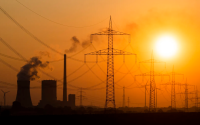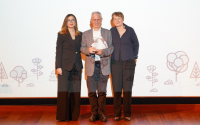28 September 2005Channel 2 Broadcasting
 Anchorage, Alaska - It's the first gathering of its kind in the United States, a chance for indigenous people to come together and voice concerns on global warming. Earlier today they talked about how it impacts the subsistence way of life and the consequences that could occur if things don't change.
Anchorage, Alaska - It's the first gathering of its kind in the United States, a chance for indigenous people to come together and voice concerns on global warming. Earlier today they talked about how it impacts the subsistence way of life and the consequences that could occur if things don't change.
Snow is desperately needed by many of the indigenous people from around the Arctic, snow makes their lifestyle a possibility.
Organizers of the conference hope to cover issues such as changing snow and ice patterns, lower water levels and animal migrations. One by one the Native elders, some who had come from as far away as Barrow, Copper Center and Huslia took turns speaking out on how global warming has affected their communities and cultur e.
e.
Margaret Opie's family depends on the ocean for survival, a subsistence life that relies heavily on Native whaling practices.
"Right now in Barrow is in a stall due to the weather. We have a lot of winds, we have, the ice is many, many miles away and that is part of our Snowchange," said Opie. "We are losing a lot of our shoreland, our beaches and our -- the cliffs -- and I have seen a lot of change in my lifetime."
 And that change is drastic, which is exactly why an organization called Snowchange was developed. Based out of Finland, the organization works to promote awareness on climate change and ecology, tailored towards indigenous people. The conference in Anchorage is the third international gathering of Arctic communities and the first one in the United States.
And that change is drastic, which is exactly why an organization called Snowchange was developed. Based out of Finland, the organization works to promote awareness on climate change and ecology, tailored towards indigenous people. The conference in Anchorage is the third international gathering of Arctic communities and the first one in the United States.
"The first and foremost form of action is getting people together. and if you get the indigenous people, local communities and others to come here even from New Zealand, Siberia, Finland and of course the indigenous people of Alaska, it's a step forward," said Tero Mustonen, founder, Snowchange.
 And, says Mustonen, time is of the essence.
And, says Mustonen, time is of the essence.
"Climate change and global warming resulting in the misuse of fossil fuels is something that we have to address now. We can't afford to wait 10 years or 20 years," said Mustonen (right).
A cry for change from those who depend on the land for every aspect of life, for those who need the call for snow to continue a way of life that has gone on for thousands of years. Snowchange hopes to have their next gathering sometime next year in New Zealand.






